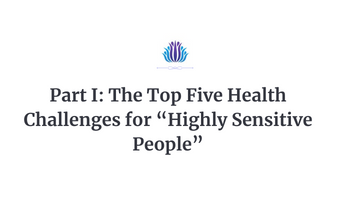When I was a kid, I remember playing with the other youngsters in our neighborhood. It was light and fun…but invariably we would end up having fights. That’s what kids do, right? In one instance, when I was about six, we were in the midst of a particularly juicy fight. I think it was about what video game we were going to play or something. Stakes which, for a six year old, are VERY high.
The details of the fight weren’t actually important, though. Rather…what I remember from the event was how it ended. One of the resident moms had come over to mediate. After hearing each of our sides of the story she sighed and said.
“Billy…your problem is that you aren’t sensitive enough. Leah…YOUR problem is that you’re TOO sensitive.”
That was the first time I realized that people functioned…differently. I realized that not everyone felt things like I did. Maybe no one person functioned like anyone else. And my special way of functioning was, at least in some measure…problematic.
Too sensitive.
The accusation didn’t stop at six. It’s carried through to the present date. I am too willing to bend. I am too spazy when I drink coffee. I feel too much. I think too much. I read between the lines too often. I care too much. I am too easily hurt. I need to just calm the f**k down.
I’ve heard it all.
At some point, I learned how to hide it. I learned how to read the signs of when my system was going on overdrive, and I figured out ways to compensate on my own. I discovered that quiet walks and runs helped me recharge. I discovered that I could speak and walk calmly even while stirred up on the inside. I worked two jobs while going to grad school. And I remembered to be grateful to even have a job when in the midst of a failing economy. And I was goooooood at playing the role of the confident demolisher of checklists and master of multitasking.
I paid for it, though. With my health. I developed adrenal fatigue and insomnia. I had always had challenges with sleep. Even my six-year-old self struggled with it. But it got bad. My nervous system felt perpetually on high-alert. I started getting what I now understand were panic attacks. And as the workload piled higher and my rest periods dwindled lower, I eventually collapsed into depression. My body was done financing my health debt.
Ironically…or perhaps fittingly , I was in the midst of studying holistic health. So I at least had some tools to play with in order to help bring myself back to something resembling myself. It also put me in a space where I could research about just what might be causing my special brand of crazy.
I stumbled upon Elaine Aron’s work on the Highly Sensitive Person. I was immediately in love. Not with her…but with her work.
It turns out that about 15 – 20 percent of any given population has a slightly more refined nervous system. It’s not just people. Lions, tigers, bears…even fish….seem to have this relatively large minority and in these approximate proportions.
And contrary to what our culture would like us to believe, it is not an evolutionary weakness. It’s actually fairly advantageous to have a subset within a group that is a bit more cautious. A bit more sensitive. We “sensitive” ones are the ones who are less inclined to chase after a risky food source. We are the ones who sense danger first, alerting the others to the presence of a predator. We pay attention.
BUT…in compensation, we have a particular brand of challenges when it comes to our health. They include:
- Highly sensitive people are sensitive to stress. That means that a stressful environment (say….an office with coworkers that don’t get along well) will cause a sensitive person’s nervous system to fire off a bit more aggressively than the average bear. That leads to more cortisol pumping. More cortisol makes us more sensitive to stress…creating a cycle of dis-ease. It also leads to cravings for the wrong kinds of foods. Sugar, anyone? That leads me to….
- Highly sensitive people are more susceptible to emotional eating. It stands to reason that if we respond quickly to stress, we will also respond quickly to the rapid fire effects of sugar to calm that down. It breeds dependence on foods which don’t serve us particularly well in the long run.
- Highly sensitive people are more prone to develop adrenal fatigue. This one is obvious. If we are more sensitive to stress and stimuli, that means our adrenal glands are firing more often than the average person. We live in an environment that feeds off of stimulation. Tax those adrenal glands and they get tired. Tired adrenal glands lead to feeling exhausted and overwhelmed.
- Highly sensitive people are more likely to have sleep disturbances, such as insomnia. It’s not so much that these folks aren’t sleepy. It’s just that their sensitive nervous systems make it easier for them to be kept awake by the body’s natural survival mechanisms. And the worst part is that sensitive people who don’t sleep well become even more affected by stress the following day. So once again… it can breed a nasty cycle.
- Highly sensitive people are more likely to develop depression. It’s not just “Oh I’m so sensitive…I think I’ll go cry in a corner.” I don’t want to lend that impression at all. Rather, when a person is more sensitive to stimuli, and their environment is perpetually stimulating, it can lead to a sense of overwhelm. The natural response should be to simply leave that environment, but that’s not always an option. A sensitive child might not be able to leave a classroom. A sensitive employee can’t just leave the office. This sense of being unable to leave produces a kind of learned helplessness which, then leads to depression.
Does any of this sounds familiar to you? Do you think you might be a sensitive person? Take Elaine Aron’s Self-Test to find out.

